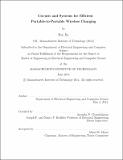Circuits and systems for efficient portable-to-portable wireless charging
Author(s)
Jin, Rui, M. Eng. Massachusetts Institute of Technology
DownloadFull printable version (6.778Mb)
Other Contributors
Massachusetts Institute of Technology. Department of Electrical Engineering and Computer Science.
Advisor
Anantha P. Chandrakasan.
Terms of use
Metadata
Show full item recordAbstract
In today's world of ever-increasing low-power portable electronics, from implants to wireless accessories, powering these devices efficiently and conveniently is an escalating issue. The proposed solution is to wirelessly recharge these lower-power portable devices through a common magnetic link with a higher-power portable device, such as a smartphone. Such a method is convenient for users, environmentally friendly, and cheap to implement. This portable-to-portable wireless charging application differs from conventional charging pad-based systems in that the transmitter is energy constrained, so system efficiency is key. Also, since both the transmitter and receiver are portable, loading on the transmitter changes dynamically, which affects efficiency and delivered power. This thesis addresses these challenges through the design of an efficient and robust wireless charging system. The first half of the thesis presents a transmitter power amplifier control loop for increasing efficiency and balancing power across changing loading conditions. Mathematical analysis of the resonant inductive wireless power circuit shows the impact of changing conditions on power amplifier zero-voltage switching, and its effect on efficiency and power. The control loop adjusts the power amplifier shunt capacitance and series inductance to maintain zero-voltage switching while regulating delivered power. The second half of the thesis presents the implementation of a resonant inductive wireless charging system operating at 6.78 MHz that transfers energy between portable devices with high efficiency. A custom integrated circuit designed in 0.18 [mu]m HVCMOS implements the derived control loop by sensing for power amplifier zero-voltage switching and adjusting the power amplifier components. An end-to-end efficiency of 78% is achieved when delivering 200 mW over a 7 mm distance. Efficiencies over 70% are maintained over 4-12 mm distances. A diverse set of applications are demonstrated that use a smartphone to wirelessly recharge a fitness tracker, a cochlear implant, an MP3 player, a calculator, a toy light, a wireless keyboard, and a bicycle light, charging most devices in 2 minutes for a typical day's use.
Description
Thesis: M. Eng., Massachusetts Institute of Technology, Department of Electrical Engineering and Computer Science, 2014. This electronic version was submitted by the student author. The certified thesis is available in the Institute Archives and Special Collections. Cataloged from student-submitted PDF version of thesis. Includes bibliographical references (pages 121-125).
Date issued
2014Department
Massachusetts Institute of Technology. Department of Electrical Engineering and Computer SciencePublisher
Massachusetts Institute of Technology
Keywords
Electrical Engineering and Computer Science.